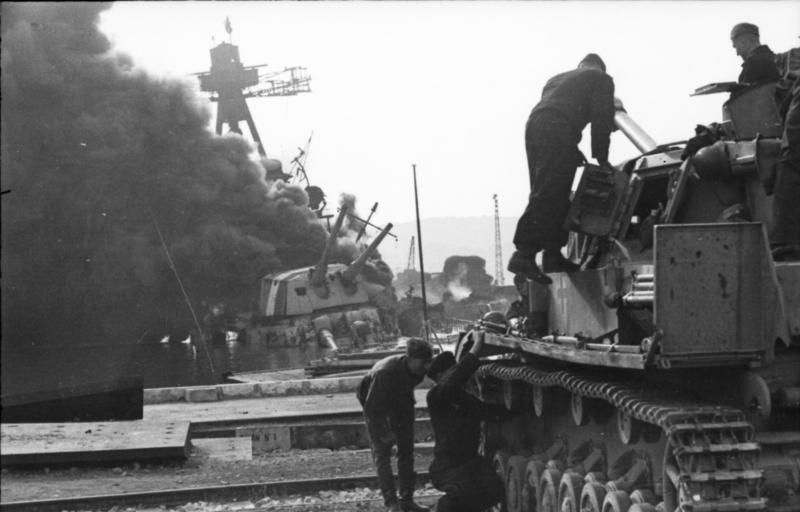The scuttling of the French fleet at Toulon in November 1942 was a decisive act by the French Navy to prevent their ships from falling into German hands during World War II.

As German forces approached, French sailors and officers quickly sabotaged and sank 77 vessels, effectively neutralizing a significant portion of France’s naval power.
Background
At the start of World War II, France was a major Allied power opposing Nazi Germany. However, the swift and devastating German invasion in May 1940 led to France’s catastrophic defeat.
This defeat resulted in the signing of an armistice on June 22, 1940, dividing France into two zones: the German-occupied north and west, including Paris, and the unoccupied southern zone, which became the center of the Vichy regime.
France’s pre-war navy was one of Europe’s strongest, with battleships, cruisers, destroyers, and submarines. Post-defeat, the fleet’s fate became a significant concern.
The British feared these ships might strengthen the German navy if captured, leading to the controversial attack on the French fleet at Mers-el-Kébir in July 1940.
Despite this, the Vichy government, particularly under Admiral François Darlan, aimed to keep the fleet neutral and out of German hands.
The situation escalated in November 1942, following the Allied invasion of North Africa (Operation Torch), when Germany moved to occupy all of France. This posed a direct threat to the French fleet at Toulon.
The French naval command there faced a tough choice: surrendering the fleet to Germany was unthinkable for both national honor and strategic reasons, but aligning with the Allies was complicated due to strained relations and complex loyalties within Vichy France.
The Scuttling At Toulon
The Germans planned to seize the fleet intact. Their intention was to take control of the ships and incorporate them into the Kriegsmarine, thereby boosting their naval strength.
However, the French naval officers, who were loyal to the Vichy regime, had strict orders to prevent the fleet from falling into either German or Allied hands.
These orders reflected the Vichy government’s desire to maintain a semblance of neutrality and sovereignty, despite its collaborationist stance.
Faced with the imminent arrival of German forces, Admiral Jean de Laborde, the commander of the fleet at Toulon, along with other senior officers, made the decision to scuttle the ships.
This decision was in line with directives from Vichy leaders like Admiral François Darlan, who had previously instructed that the fleet should not be surrendered.
On November 27, 1942, as German troops entered Toulon, the French Navy executed a well-coordinated scuttling operation. Crews worked swiftly to sabotage their ships: they opened seacocks to flood the hulls, destroyed critical machinery, and set explosives.
 German soldiers watch as the French cruiser Colbert burns during the scuttling at Toulon. Image by Bundesarchiv CC BY-SA 3.0 de
German soldiers watch as the French cruiser Colbert burns during the scuttling at Toulon. Image by Bundesarchiv CC BY-SA 3.0 de
The scuttling was thorough; within hours, the majority of the fleet lay sunk or severely damaged in the harbor.
The effectiveness of the scuttling made it clear that the ships were rendered unusable, thereby ensuring they would not augment German naval power.
Aftermath
After the scuttling of the French fleet at Toulon on November 27, 1942, several immediate and long-term consequences unfolded, affecting World War II, the state of the French Navy, and the political dynamics in France and beyond.
Immediately, the German forces, surprised by the extent and effectiveness of the scuttling, were unable to capture the majority of the fleet.
Most of the major warships were sunk or severely damaged.
In response, many French sailors were arrested and imprisoned by the Germans, with some being sent to labor camps.
 The wreckages of the ships scuttled in Toulon, still present in late 1944.
The wreckages of the ships scuttled in Toulon, still present in late 1944.
The Allies, particularly the British, were relieved that the fleet did not fall into German hands.
However, this event did not significantly alter the overall strategic situation in the Mediterranean or the broader trajectory of the war.
For Vichy France, the scuttling further weakened its already fragile position, highlighting its inability to protect French interests and maintain its policy of armed neutrality.
The event also influenced internal dynamics, possibly swaying some towards the Resistance and demonstrating the limits of collaboration with Germany.
In the long term, the destruction of a significant portion of its naval fleet had profound implications for France. The French Navy had to essentially rebuild from scratch after the war, affecting its post-war capabilities.
Politically and morally, the scuttling became a symbol of resistance against German occupation, adding complexity to the narrative of French resistance during the war.